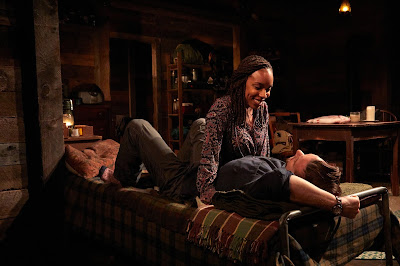By James V. Ruocco
Shattered dreams.
A bloody prom night.
Teen cruelty.
Telekinetic powers.
The ultimate revenge.
A happy ending.
Not even close.
One of the many joys of Broadway Method Academy's thrilling staging of "Carrie: The Musical" is that it offers us a timely horror story about a misunderstood high school girl and outcast that's both invigorating and original, but also scary, spooky, wicked and crazily demented.
Its timing couldn't be perfect.
Halloween is waiting in the wings.
Based on the novel by Stephen King and the 1976 Brian De Palma movie that starred Sissy Spacek and Piper Laurie, "Carrie: The Musical" cleverly retains the juggernaut energy of the original story and the eerie confidence of the film adaptation. It also works as a stand-alone musical about revenge, death, bullying, telekinesis, sexuality, damnation and social acceptance.
The Broadway Method Academy presentation, which is being staged at the school's handsome, brand new studio theater, succeeds on every level.
The closeness between actor and audience is intoxicating. It not only puts you in the middle of the action, but you're so close, it's almost as though you are part of the "Carrie" cast. The space itself holds endless creative possibilities. The bloody hell that erupts from Carrie White's telekinetic mayhem is spellbinding.
In short, never underestimate the power of theater.
This "Carrie" is edgy.
It is revolutionary.
It is daring.
It is explicit.
It is emotional.
It is astonishing.
It is unforgettable.
As with most BMA productions including the phenomenal "Evita," which was staged earlier this year at the Westport Country Playhouse, one of the key components of this presentation and others is to showcase the vocal, acting and dance talents of the dedicated, animated, excited and hard-working students of the Broadway Method Academy. Here, as in "Evita," this incredible group of aspiring performers reflect BMA's on-going commitment to nurturing and showcasing the raw, real talent of tomorrow. Their artistic mindset and confidence is unparalleled.
"We wanted to create a safe place for students to not only grow as performers, but as people. In every program, we run, our goal is to build community. The arts enrich the community and the BMA community is alive and well."
Connor Deane/J. Scott Handley (Co Founders/Executive Directors/Broadway Method Academy)
In terms of staging, Handley gives his hard-working, devoted and determined cast plenty to do, offering each and every one of them a time, place and character that is entirely their own and one they can shape and develop individually on their shared, emotional stage journey. Moreover, no two actors are alike. They each have their own style, personality and voice, a condition that keeps them firmly grounded as actors, singers and dancers. Just watch them. It's in their eyes. It's in their body language. It's in their reactions. It's in their movements.
Elsewhere, careful attention is given to the horror elements of the story which include Carrie's evolving telekinetic powers; the vicious prom night prank involving a bucket of spilled pig's blood all over Carrie; and finally, her ultimate revenge on the entire student body and her Bible-preaching mother via voltage-charged telekinesis. As director, Handley orchestrates these moments and others with flair, excitement, surprise and scariness. The cast, in turn, play it all for real using just the right amount of roller-coaster emotion, fright and suspense as indicated by both Handley and the actual play text. The intimate Studio Theater setting also heightens the thrill, the shock and the horror as the production inches toward its edgy, high-pitched conclusion.
The musical score for "Carrie: The Musical," written by Michael Gore (music) and Dean Pitchford (lyrics), contains 19 musical numbers. They include "In," "Carrie," "Open Your Heart," "And Eve Was Weak," "Unsuspecting Hearts," "I Remember How Those Boys Could Dance," "A Night We'll Never Forget," "Why Not Me?" "Once You See," "You Shine" and "When There's No One." It is a quirky blend of of workable pop rock, bubble-gum, operatic sweeps, rhythmic twists, dicey character pronouncements and upbeat, driven melodies.
For this reworked version, several numbers from the original Broadway production have been excised by the show's creators including "Dream On," "It Hurts To Be Strong," "Heaven," "Don't Waste the Moon" and "Wotta Night."
The controversial "Out For Blood," which originally opened Act II in the original 1988 Broadway production has also been scrapped. Wild, crazy and shocking, this ritualistic bacchanal dance about the slaughtering of pigs (squeals and bloody gore included for shock value) was choreographed by Debbie Allen in fevered, demented, ritualistic fashion. It served its purpose and got pulses racing, but the very idea of teenagers jumping around a pig pen bathed in pig's blood was a bit much for theatergoers to digest so Gore and Pitchford replaced it in 2012 with "A Night We'll Never Forget," a sweet-sounding, effective ensemble number about prom night and the events waiting to take place in the high school gymnasium on that fateful night.
Doubling as music director, Handley is joined by Alison Grimes (conductor/keyboard), Jake Brownstein (guitar), Michael Goodman (bass), Dani Battat (keyboard) and Ryan Fedak (drums). Musically, the songs themselves are serviceable to the plot and the advancement of the story. The new ones, mixed with those from the 1988 Broadway production are effective enough and are deftly performed by the entire "Carrie" cast. With Handley pulling the strings, so to speak, every one of the musical numbers reflects the tension, angst, heartache, sentiment, sweetness and craziness set forth by the show's creators. No one misses a beat. The voices are strong, melodic and emotionally pleasing. As are, the full choral sounds and harmonies.
Choreography for "Carrie: The Musical" is provided by Ashley Simone Kirchner. From start to finish, there are sparks. There is style. There is uniqueness. There is individuality. There is sensuality. There is fluidity. Using upbeat movement, flavorful dance tableaux's, choice rhythmic couplings and synchronization, Kirchner is at the top of her game. No matter what she crafts or creates, the production maintains a marvelous flourish, zest, pulse and theatricality that is absolutely contagious. The cast, in turn, reciprocate, most agreeably. It's "Mean Girls" meets "Carrie" with a dash or two of "High School Musical," "Glee" and "The Rocky Horror Show" thrown in for extra measure.
Vocally, she impresses with a strong, beautiful and pleasant voice that reaches far beyond the music of the show's creators. It is honest, truthful, polished and very, very natural.
As Margaret White, Carrie's religious, fanatical mother, Andrea Kennedy approaches and plays her part with the loving, strange and homicidal relish associated with her crazy role. She's absolutely brilliant at every manic and dramatic turn. And vocally, she's just as strong (her rendition of "When There's No One" is positively heartbreaking) and polished as her young co-star. Together, they are a convincing mother and daughter team.
As Billy Nolan, the charismatic Kai Marrelli has great fun being a nasty, priggish, loud-mouthed bad boy, showoff and prankster who helps Chris humiliate Carrie at the high school prom. Being the resident bad boy is not an easy feat to pull off, but Marrelli doesn't just play the part, he owns it. He is in his element and it shows. The actor is also well-matched opposite Vitale. They are such a twisted, convincing duo, their fate at Carrie's hand in the middle of Act II is immediately welcomed and applauded.
Julie Kavanagh, BMA Artistic Director/Resident Choreographer, delivers an honest, genuine. emotional performance as Ms. Gardner, the gym teacher who bonds with Carrie and offers supportive advice to the misunderstood teen throughout the two-act musical. She has great stage presence, a fine singing voice and one of the most dazzling smiles on record. Her portrayal is fraught with such honesty, her teacher character is someone you'd immediately entrust to guide, nurture and shape your kids, both academically and morally.
As the kind-hearted, sympathetic Sue Snell who befriends Carrie, Emerson Raymond offers a compassionate, full-bodied performance while Julia Vitale (excellent as Peron's Mistress in "Evita") crafts an appropriately evil display of nastiness as Chris Hargensen, the two-faced bitch who taunts and torments Carrie until she finally gets her just comeuppance near the end of Act II much to the delight of everyone in the audience.
"Carrie: The Musical" is must-see entertainment. It has clarity, insight, passion and imagination. It delivers the goods with a fearful emotional wallop that gets under your skin and stays there. It teases and taunts. It raises the roof on fresh and eerie. It puts a decidedly current spin on teen life, academics, religion and parenting. It also raises the bar on terror, or in this case, a bloodbath of justified revenge with a very high body count. Pig's blood aside, this "Carrie" means business.
"Carrie: The Musical" is being staged by Broadway Method Academy (1935 Black Rock Turnpike, Fairfield, CT), now through Oct. 28.
For tickets or more information, call (203) 675-3526
website: broadwaymethodacademy.org






























































